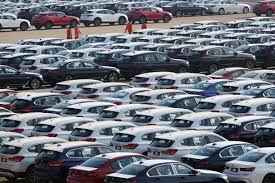
The number of automobiles sold in China increased to 2.38 million units in August, up 32.1% from the same month last year. Electric vehicles (EV), whose sales have been boosted by government incentives, have been the main driver of this recovery.
According to data released on Friday by the China Association of Automobile Manufacturers (CAAM), sales for the first eight months were 1.7 per cent higher than they were during the same time in 2021.
Pure electric, plug-in hybrid, and hydrogen fuel-cell vehicle sales increased by 100 per cent in August compared to the same month last year.
While the China Passenger Car Association, which released July sales data on Thursday, focuses on retail sales of cars, CAAM tracks a wider range of auto sales, including those of passenger vehicles, buses, and trucks.
According to CAAM, China's exports of vehicles increased by 65 per cent from the previous year, with electric vehicles making up 27 per cent of those exports.
Sales in August, however, were 1.5 per cent lower than in July due to power restrictions that hampered automakers' ability to produce their products and China's longest and most extreme heat wave since records began in 1961 that discouraged customers from visiting showrooms.
China has tried to boost auto demand in the face of a faltering economy by offering incentives like a lower sales tax for small-engine vehicles and subsidies to encourage the trade-in of gasoline vehicles for electric ones.
However, more cities, such as Shenzhen and Chengdu, have implemented new lockdowns as Beijing continues to adhere to its "dynamic zero" COVID policy to break every chain of transmission.
With automakers like Volvo, Toyota, and Volkswagen either halting production or converting their factories to closed-loop systems, which typically still has an impact on output, those measures are weighing on the industry once more.
With months of strict lockdowns in the major manufacturing hubs of Shanghai and Changchun, the sector was severely hit earlier in the year.
(Source:www.usnews.com)
According to data released on Friday by the China Association of Automobile Manufacturers (CAAM), sales for the first eight months were 1.7 per cent higher than they were during the same time in 2021.
Pure electric, plug-in hybrid, and hydrogen fuel-cell vehicle sales increased by 100 per cent in August compared to the same month last year.
While the China Passenger Car Association, which released July sales data on Thursday, focuses on retail sales of cars, CAAM tracks a wider range of auto sales, including those of passenger vehicles, buses, and trucks.
According to CAAM, China's exports of vehicles increased by 65 per cent from the previous year, with electric vehicles making up 27 per cent of those exports.
Sales in August, however, were 1.5 per cent lower than in July due to power restrictions that hampered automakers' ability to produce their products and China's longest and most extreme heat wave since records began in 1961 that discouraged customers from visiting showrooms.
China has tried to boost auto demand in the face of a faltering economy by offering incentives like a lower sales tax for small-engine vehicles and subsidies to encourage the trade-in of gasoline vehicles for electric ones.
However, more cities, such as Shenzhen and Chengdu, have implemented new lockdowns as Beijing continues to adhere to its "dynamic zero" COVID policy to break every chain of transmission.
With automakers like Volvo, Toyota, and Volkswagen either halting production or converting their factories to closed-loop systems, which typically still has an impact on output, those measures are weighing on the industry once more.
With months of strict lockdowns in the major manufacturing hubs of Shanghai and Changchun, the sector was severely hit earlier in the year.
(Source:www.usnews.com)














